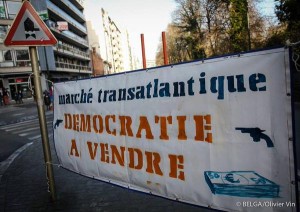Reactions to TTIP in France Show Hesitation, Fear
The main opposition party, the Republican Party, seems to exhibit the most unified support for the TTIP despite others’ concerns about the obscurity of negotiations. The TTIP seems to garner more support among the traditionally mainstream political parties, though dissidents are still present within both parties.
Outside of the Republican Party and the Socialist Party, the TTIP has been viewed with growing suspicion. Parties which usually have nothing in common agree on the danger of TTIP, particularly for agricultural and commercial norms. Jean Luc Mélanchon, the leader of the Leftist Front, describes the United States as “an imperial power, with no friends and with only interests.” Similarly, the Green Party (EELV), fears a race to the bottom for agricultural norms. Marine Le Pen, leader of the Front National, warned in an anti-TTIP video of an impending “ultra-liberal massacre,” which would reinforce the dictatorship of banks should the TTIP be ratified.
These three parties have traditionally operated under a more anti-globalization approach favoring economic protectionism. With regional elections looming, these parties are attempting to play on the fears of the voters, particularly in relation to genetically modified organisms. While the TTIP states that regulation will not change on sensitive issues like hormone-treated meat, parties such as the Leftist Front, Green Party, and National Front have played directly into these fears as a means of protesting current TTIP negotiations.
Some fear that businesses could potentially misuse international courts to bypass norms. The TTIP proposal includes the creation of an Arbitration Tribunal, to which European members of parliament have responded hesitantly. Considering France’s employment laws, agricultural norms, and history of protectionism, there is a genuine fear among French parties that American multinational corporations may unilaterally impose their laws on French soil. Many French are afraid that the Arbitration Tribunal will favor businesses over the state, a fear which has been voiced most successfully by the far-right and the far-left parties through anti-capitalist and anti-establishment rhetoric. In fact, a recent study shows that only 15 percent of French people think capitalism is functioning reasonably.
While the government does not intend to reject the treaty, it nonetheless behaves very cautiously, keeping open the option to back out of the negotiations. Meanwhile, the majority of French parties see this treaty as a way for the United States to further impose its economic hegemony in Western Europe and undermine both France’s agricultural industry and European commercial norms.

